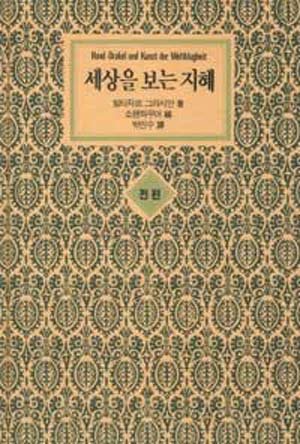Lighthouse Lighting Happy Life
Lighthouse Lighting Happy Life
Posted September. 27, 2002 23:07,

Wisdom for Looking into the World, By Baltasar Gracian, Translated by Park Min-soo, p. 176, 6,000 won, published by Archimnara
Do not argue with your seniors. Being superior is the target of hatred A prudent person would hide the merits ordinary people would show off. For example, would hide their beauty in dirty clothes.
Wisdom for Looking into the World is a Proverbs which introduces the wisdom we need to live by in this barren world. This book stresses the brave spirit with which we smartly adjust ourselves to this ruthless reality, but keep ourselves motivated for a better reality.
Throughout the book, the author advises, Even the tough heart and the head are two extremes of human ability, they should also be equipped with intelligence and mind. And When in happiness, it is easy to earn favors and life is full of friendship. But for unfortunate days, save the friendship and some works to be rewarded.
The author Baltasar Gracian was a Spanish writer and philosopher in the 17th century. This book became known when a German philosopher Arthur Schopenhauer translated it into Germany, and introduced it in Europe.
This book Wisdom for Looking into the World, was first published in Korea in 1991, and so far 2,600,000 copies of it have sold. Even in these days, 20,000 copies are sold every year. Its advertising copy, which reads A book deserves to be put before the life of a cherished person, has also contributed to its fame.
Hwang Keun-shik, president of Achimnara, met with this book by accident in October of 1991. In a bookstore in Muchen, Germany, he asked the clerk of the bookstore for a book recommendable to Koreans, and she later recommended the book.
In 1996, the sequel to Wisdom for Looking into the World came out. But the sequel is not a book of a European philosopher, but a compilation of the written works of a Chinese philosopher in Ming Dynasty. In the sequel, we are introduced to ways of exploring the value of lie.
The sequel recites in low tone what it means to be a real human being and, for example, says, It is necessary to advise a person easy to argue or likely to find faults of others to look back on himself.
Regardless of the age we live in, it always poses us difficulty in finding answers to how to live wise. Neither surrendering to the mainstream nor resisting it is the answer. Maybe, a life pursuing the inner strength and outer kindness will be the life full of wisdom.
Tae-Hun Hwang beetlez@donga.com






